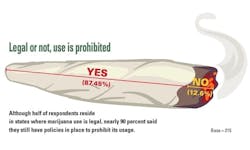As marijuana usage becomes more acceptable, the often-legal drug is increasingly showing up in employee drug tests. For managers of construction equipment fleets, marijuana usage not only poses problems in terms of operator impairment, but it also puts pressure on hiring practices, as pre-employment drug screening limits the pool of applicants in a tight labor market.
Construction Equipment polled its subscribers to determine marijuana’s impact on equipment operations. Of the 303 respondents, 73 percent said that their company does drug testing. The respondents who test were invited to continue on with the questionnaire to answer more specific questions about the practice, providing a sample of 215.
Quest Diagnostics, a national provider of workforce drug tests, reported in May 2021 that marijuana usage among the general U.S. workforce increased in 2020 compared to 2019. It based its analysis on a database of more than seven million urine drug tests collected between January and December of that year. Whereas positivity for most drugs fell or held steady, marijuana showed up in more drug tests in 2020 than it did in 2019.
In an article reporting on the data, the Wall Street Journal noted that some industries—such as hospitality—are easing the requirement that job applicants test for marijuana while others—such as trucking—have seen increasing difficulties with labor as pot usage increases.
Marijuana testing has affected fleets’ ability to find qualified labor, according to 56 percent of respondents. One respondent said their company has a zero tolerance policy for equipment operators, does both pre-employment and random testing for the drug, and not only is having trouble finding applicants, but is also losing employees due to marijuana use.
Another respondent suggested that the legal users are the same who used to be illegal users, so “nothing has really changed.”
In the Quest data, marijuana positivity differed between states that have legalized the drug for recreational use, only for medicinal purposes, or not at all. Marijuana positivity in states with legal recreational use statutes grew from 2.2 percent in 2012 to 4.8 percent in 2020. In states with only medical marijuana statutes, marijuana positivity increased from 1.9 percent in 2012 to 3.2 percent in 2020. In states with no medical or recreational marijuana statutes, marijuana positives increased from 1.9 percent in 2012 to 3.0 percent in 2020.
“Our data suggest that marijuana positivity has increased sharply nationwide since states began to legalize marijuana in 2012,” said Barry Sample, PhD., senior director of science and technology for Quest.
Respondents to to the CE survey were split almost evenly between those in states where marijuana is legal and those in states where it is not.
Even so, 87 percent of respondents said they have a policy against marijuana use independent of state law. In Springfield, Illinois, located in one of 18 states where marijuana is legal for recreational use, marijuana usage is still illegal in the workplace. All state employees are randomly tested for alcohol and drug use, according to city fleet manager Timothy Wier, and if they are involved in an accident or equipment is damaged, “they are tested,” he says.
About 80 percent of respondents randomly test their truck drivers and equipment operators for the drug. Yet 15 percent and 16 percent, respectively, do not “regularly” test drivers or operators even though their companies do drug testing.
Of those that test for drug usage, 88 percent said that they include marijuana in those tests.
Ducati Earth International in New Hampshire, where marijuana is legal for medical use only, is surrounded by states where it is legal, according to owner Michael Regn.
“Alcohol has destroyed more families than pot ever has,” says Regn. “We random drug test once or twice a year, and we’ve never had anyone fail.”
Testing positive for marijuana almost always results in disciplinary action, according to respondents, and 42 percent say employees are terminated if tests reveal marijuana in their systems.
Lanford Bros. has “zero tolerance” for any drug use, says Alan Slater. Located in Roanoke, Virginia—where marijuana became legal in July—Lanford does bridge rehabilitation work for the departments of transportation in Virginia and North Carolina—where marijuana is completely illegal.
“We random test every week to stay within [project] rules,” Slater says. “We have lost some good employees because of this, but they all know the rules that we have to go by.”
North Carolina and Virginia are also right to work states, but in states with a strong labor union influence, discipline for marijuana violations may be addressed in labor contracts.
An Illinois contractor, who wished to remain anonymous in this heavily unionized state, says the testing has diminished since the state legalized the drug. “The industry has been unable to come to a consensus on how the handle it (contractors and unions alike),” they said, “and not for lack of discussion.”
The company has opted to treat marijuana the same way it treats alcohol use: “You cannot by ‘high’ on the job, but we will not test for it.”
Patricia D. Murray, president of Envirenew in Maryland, where medicinal use is legal, does not test for the drug unless a contract requires it. She acknowledges that some employees may be using and is concerned about liability. She recently had a truck driver injure himself on the job. He went to the hospital for treatment under workers’ compensation, but when the hospital asked for a urine test as part of the claim process, he declined. The driver was then responsible for paying the hospital.
About the Author
Rod Sutton
Sutton served as the editorial lead of Construction Equipment from 2001 through 2025.
